|
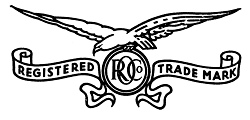
The Owen Organisation is always thought of as a
Darlaston firm, and rightly so. The Organisation's base
at Darlaston, although large in manufacturing terms, is
only a small part of the story, which covers much of
this country, and spreads across other continents.
By the 1960s the Owen Organisation employed
around 15,000 people, in eighty eight companies, operating on
five continents, and became one of the country's largest
private companies.
The Organisation manufactured products and parts for
almost every industry, and manufactured, or supplied,
almost everything for use in the home.
The Structural Department supplied the structural
steelwork for many of the country's iconic buildings,
and even produced pre-fabricated houses for a time,
after the Second World War.
There can't have been many British companies that
operated on the same scale as the Owen Organisation, it
was unique. |
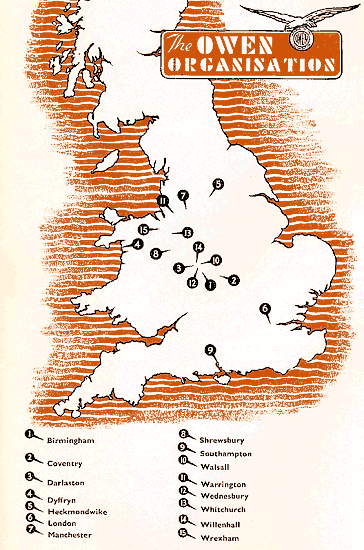
A map produced by Rubery Owen,
showing the location of the UK subsidiary companies in
1947. |
| An impression of the Organisation's vast range of
products, can be got by looking at the photographs
below, which show parts of the company's display at the
British Industries Fair in May 1947, and in 1949, at Castle
Bromwich. |
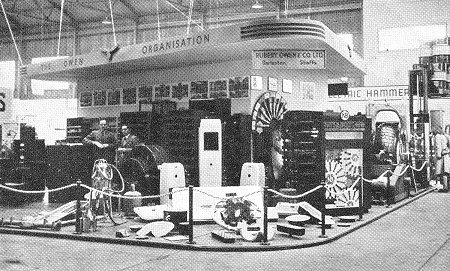 |
Products on display, on this
part of the stand, include nuts and bolts, pressings,
axles, wash basins, shelving and storage units, and
parts for machinery.
From the summer 1947
edition of the staff magazine "Pyramid". |
| This part of the display
includes lathes, machinery, component parts, and
shelving.
From the summer 1947
edition of the staff magazine "Pyramid". |
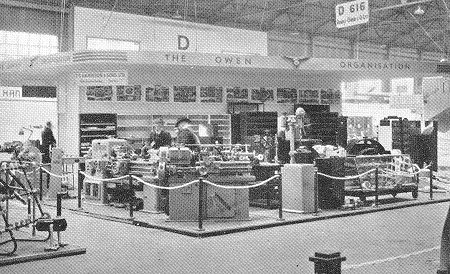 |
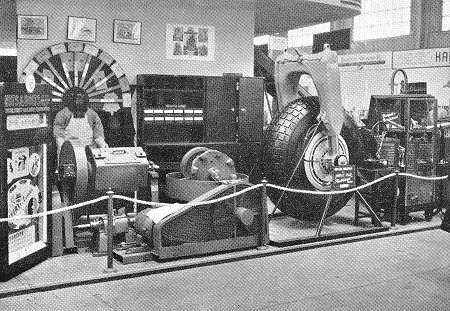 |
Another part of the display
includes an aircraft wheel and part of an undercarriage,
machinery, nuts and bolts, and storage units.
From the summer 1947
edition of the staff magazine "Pyramid". |
| Another display at the same
event was provided by another member of the
Organisation, Shuker & Son. It includes garden tools, a
lawnmower, kitchen units, and mirrors.
From the summer 1947
edition of the staff magazine "Pyramid". |
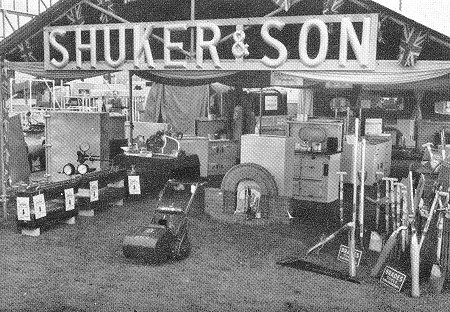 |
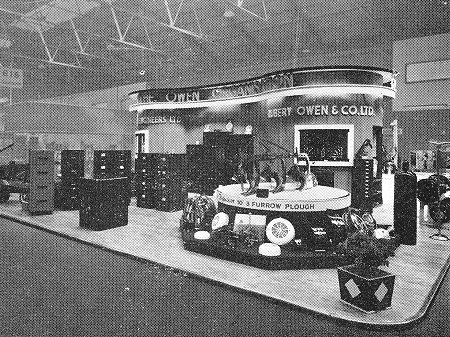 |
The Organisation also had stands at the 1949 British
Industries Fair, also held at Castle Bromwich. This
stand includes a 3 furrow plough, fans, filing cabinets,
storage units, and what appears to be motor wheels.
From the summer 1949 edition of the
staff magazine "Goodwill". |
| The Easiclene display includes
kitchen units, sinks, and sink units.
From the summer 1949 edition of the
staff magazine "Goodwill". |
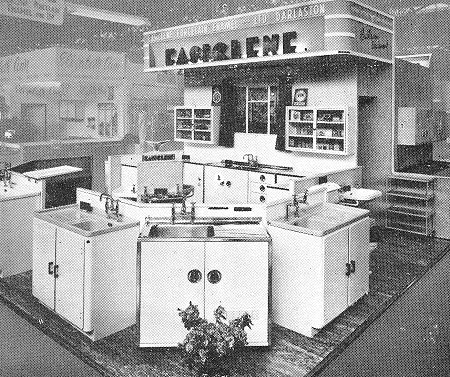 |
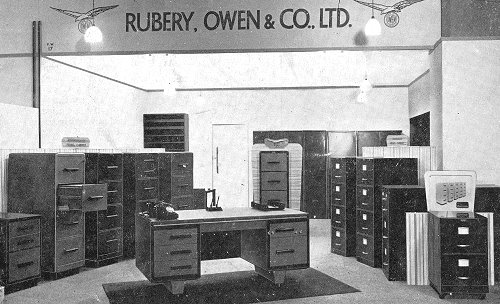 |
The Organisation's stand at
the Business Efficiency Exhibition at Olympia in October
1949 showing some of the company's office furniture.
From the spring 1950 edition of the
staff magazine "Goodwill". |
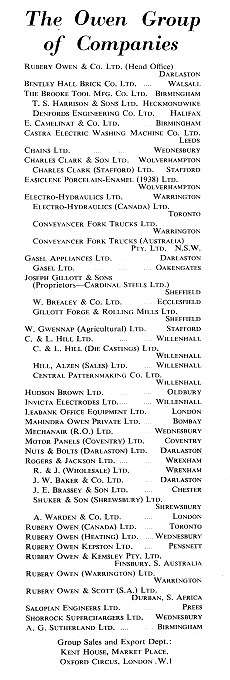
From Histories of Famous Firms - Midlands Survey part one,
1960. |
One of the organisation's companies, which became
well-known for its specialised products, was Invicta
Electrodes Limited in Bilston Lane, Willenhall, on a
corner of the main Rubery Owen site.
The firm produced a wide range of electrodes suitable
for welding mild steel, medium high tensile cast iron, steel
reinforcing, and stainless steel.
The electrodes were marketed
using the trade name "Wey", including "Speedway" and "Deepway",
and were produced on machinery built by companies within the
Owen organisation.
The factory was extended during the Second
World War to enable the firm to fulfil a number of Government
contracts which resulted in the production of millions of feet
of electrodes.
The factory had all of the latest facilities
including chemical and mechanical laboratories, X-ray machines,
and microscopy, to ensure that the products were of the highest
quality.
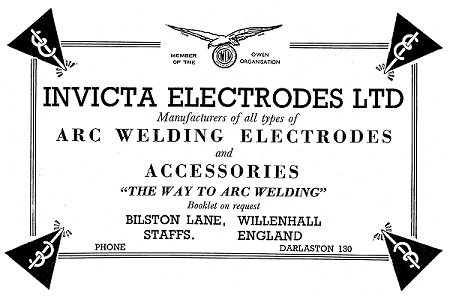 |
| |
|
|
| |
|
Read about some of the companies: |
 |
|
C. & L. Hill Limited,
Willenhall |
 |
|
Bentley
Hall Brick Company Limited, Bentley, Walsall |
 |
|
Chains
Limited, Moxley |
 |
|
Nuts &
Bolts (Darlaston) Limited |
 |
|
Charles
Clark & Son Limited, Wolverhampton and Shrewsbury |
 |
|
The
Brooke Tool Manufacturing Company Limited, Birmingham |
 |
|
A. G.
Sutherland Limited, Birmingham |
 |
|
Salopian
Engineers Limited, Prees, Shropshire. |
 |
|
Motor
Panels (Coventry) Limited |
 |
|
Rubery,
Owen & Company Limited, Wrexham |
 |
|
Rogers &
Jackson Limited, Wrexham |
 |
|
Electro-Hydraulics Limited, Warrington |
 |
|
Rubery
Owen (Warrington) Limited |
 |
|
Camelinat
and Company Limited, Birmingham |
|
|
|
|
|
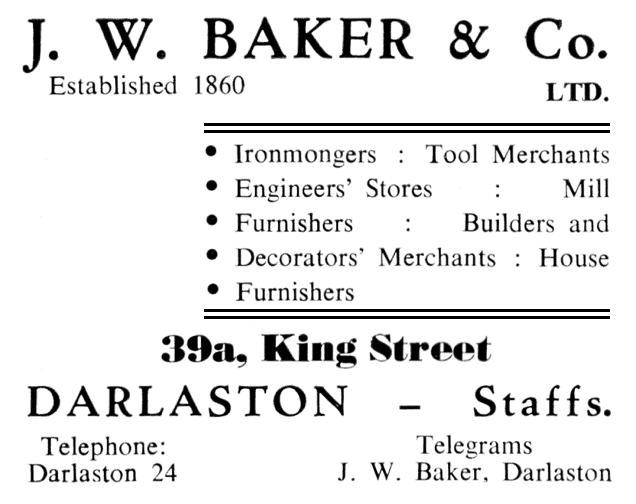
Courtesy of Christine and
John Ashmore. |
|
It is often forgotten that
Darlaston's wonderful ironmongers in King Street was
part of the Owen Organisation.
J. W. Baker & Company Limited, in
King Street, in about 1965.
Courtesy of Bill Beddow. |
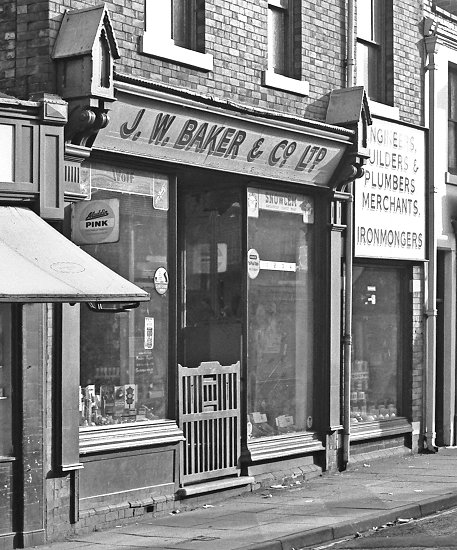 |
|
Rubery, Owen & Company Limited, Coventry
A branch factory was established in
1936, in Paynes Lane, Coventry, for the production of
pressed and fabricated assemblies that were used to
assist production at Darlaston, and also supplied to
industry in general.
During the Second World war, the
factory produced large numbers of pressings, and
essential war equipment, including floats, buoys, mine
containers, steel helmets, fuel tanks and Soyer Stoves
for field kitchens.
After the war, many of the small
components and assemblies produced at the factory were
for the local vehicle manufacturers. The company
specialised in general sheet metal working, especially
in limited quantities, particularly fuel tanks for
commercial vehicles. Orders for larger quantities were
dealt with at the Darlaston factory. |
|
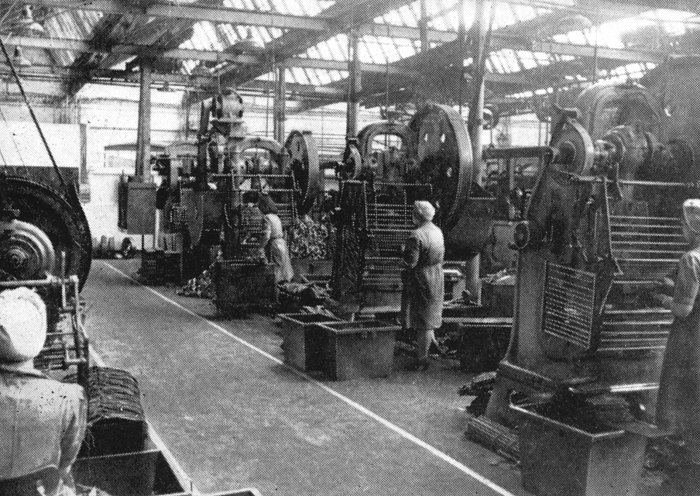
Part of the press shop at
Coventry. |
|
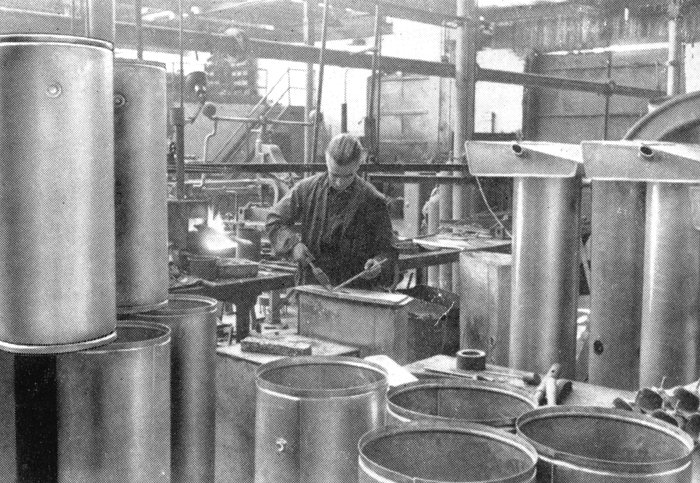
Assembling pressed ends of fuel
tanks for commercial vehicles, at the Coventry factory. |
|
Denfords Engineering Company Limited, Halifax
Denfords Engineering Company
Limited, began in a small way in 1931, manufacturing
jigs and fixtures. The business flourished, and larger
premises were soon needed.
In the late 1930s, the company
began to manufacture a range of precision jigs and
fixtures, both for general industry, and particularly
for the Aircraft Industry. At the same time, development
of comparator gauges began, which after Government
approval, were
produced in large quantities.
A new factory was established at
Box Trees Mill, Wheatley, Halifax, where sine tables,
sine centres, straight edges and other equipment was
added to the product range.
After the war new products were
added, including plain 3 inch bench lathes, and a new
and improved type of light screw cutting lathe, aimed at
general engineering industries, research laboratories,
and education authorities. A new model, the 'Box-Ford'
4½ inch screw cutting lathe was introduced, which sold
extremely well. They were sold in the UK and exported to New Zealand, South Africa, Kenya, Norway,
Holland, Egypt and Canada.
The firm became a member of the
Owen Group in 1949, due to its association with T. S.
Harrison. |
|
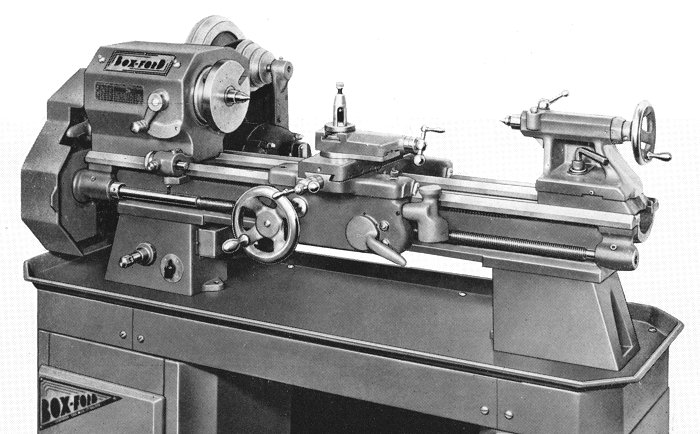
A 'Box-Ford' 4½ inch screw cutting lathe. |
|
Australia In 1946 work began on equipping a factory in South
Australia to house a subsidiary of Rubery, Owen &
Company, Limited. The factory was in part of
the Finsbury gun ammunition factory, covering over
200,000 square feet.
The new company would be called Rubery, Owen
& Company (Australia), Limited and would produce
automotive components such as road wheels, chassis
frames, axle casings and motor pressings, for the large
Australian car manufacturers in Adelaide and elsewhere,
including General Motors, Holdens, and Chrysler.
Mr.
Hambleton, Managing Director of the Australian branch,
recruited a lot of skilled personnel in the UK to work
in the factory, mainly from the London area. Other Australian subsidiaries included Rubery Owen & Kemsley Pty Limited
in Adelaide, who supplied components to the Australian
car manufacturers, and to the agricultural industry, and
two members of the
Conveyancer Group,
Conveyancer Pty Limited (Australia), and Paul-Walden Pty Limited (Australia). |
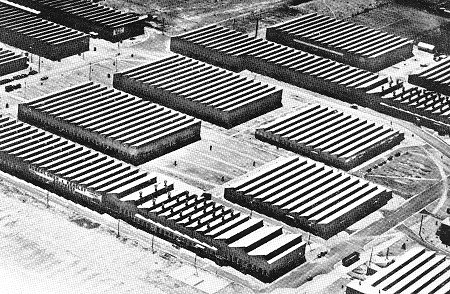 |
Part of the 30 acre Finsbury
factory site, occupied by 13 companies. Rubery Owen had
the three buildings in the foreground.
From the summer 1948 edition of the
staff magazine "Goodwill". |
|

Part of the Finsbury Factory.
From the Christmas 1947 edition of the
staff magazine "Yuletide". |
|
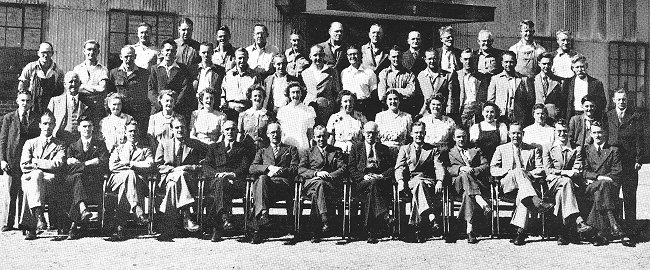
The Finsbury staff in 1948.
From the summer 1948 edition of the
staff magazine "Goodwill". |
|
Rubery, Owen & Kemsley (Pty.) Ltd., Australia
Rubery, Owen & Kemsley
Proprietary Limited was incorporated in Adelaide in
the State of South Australia in November, 1946, to
manufacture automotive components. The factory with
a floor area of 120,000 square feet, was previously
part of the Finsbury Ammunition Factory, situated 7
miles from Adelaide.
The new company was fully
equipped with a modern tool room and machining plant
that produced tools and jigs. There was also an
extensive press plant with single and double-action
type presses, of up to 750 tons capacity, and a
processing and finishing plant. The products
consisted of components for the automotive and
agricultural industries.
The rim and wheel section
produced thousands of wheels for leading makes of
vehicles, including Chrysler, and General Motor-Holdens.
The press shop produced pressings for trucks and
tractors, including valve housings, manifold heat
shields, water header covers, chassis members and
bumper bars. There was also a section that
specialised in the general assembly of imported
commercial trucks, cab-bodies, and saloon cars. |
 |
|

Two external views of the
factory. |
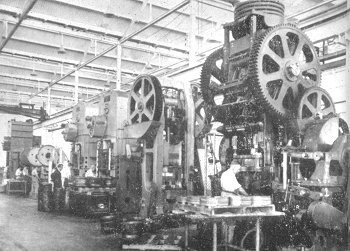 |
|
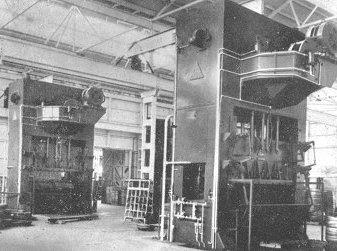 |
|
Two interior views of the
factory. |
|
| In the 1970s and 1980s many of the subsidiary
companies were either sold or ceased to operate. In 1993
Rubery Owen Holdings Limited decided to move away from
manufacturing, and so any remaining manufacturing
subsidiaries were sold. It now concentrates on property,
investment, and a small number of independent operating
subsidiaries. |
 |
|
 |
Return to
Sports & Leisure |
|
Return to
the contents |
|